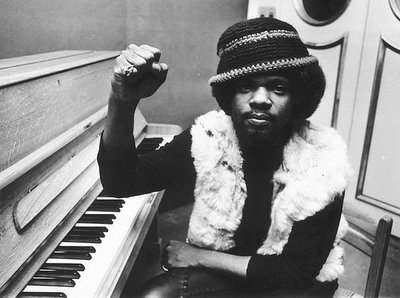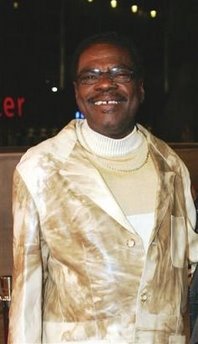

http://www.latimes.com/news/obituaries/la-me-preston7jun07,0,2842449.story?coll=la-home-headlines
From the Los Angeles Times
Famed Soul Singer Billy Preston Dies
By Geoff Boucher
Times Staff Writer
7:03 PM PDT, June 6, 2006
Billy Preston, a soul singer and keyboardist who scored such hits as "Nothing From Nothing" and "Outa-Space" in the 1970s but was best known for sitting in on historic recording sessions with the Beatles, the Rolling Stones, Aretha Franklin and Bob Dylan, died Tuesday in Arizona. He was 59.
The charismatic Preston had suffered for years from kidney-related ailments and slipped into a coma in November, according to Joyce Moore, his manager. On Saturday, his condition worsened and he was taken to a hospital in Scottsdale, she told the Associated Press.
Preston's renal problems were the result of his longtime drug use, which also led to his some dark chapters in the 1990s, when he entered court-ordered rehabilitation and was jailed for a variety of offenses.
Those grim days stand in stark contrast to the image of Preston in the public mind: With his amiable personality, toothy grin and towering afro, Preston became a well-known character in the 1960s and '70s rock scene and a coveted player in the studio and on stage.
"Billy was a fantastic and gifted musician ... a superb singer in both recording sessions and onstage," Stones singer Mick Jagger said Tuesday in a statement. "He was great fun to be with ... and I will miss him a lot."
Elton John also praised Preston as a true master of the organ and piano: "He was one of my true inspirations, one of the greatest keyboard players of all time and not too shabby a vocalist, either."
Preston had a stunning career odyssey that again and again put him in the same room with music history. He was there during the "Let It Be" session with the Beatles and not only made memorable keyboard contributions to "Get Back" but joined them in a London rooftop concert that turned out to be the iconic band's final live performance.
"Musically, my favorite moment was on the roof for 'Let It Be,' " Preston told the Chicago Sun-Times in a 2004 interview.
Preston also was in on studio sessions for Sly & the Family Stone's "There's a Riot Goin' On," Dylan's "Blood on the Tracks," Franklin's "Young, Gifted and Black" and the Stones epic "Exile on Main Street." Preston even showed up in a notable track listing he didn't play on: Miles Davis named a song in his honor on his 1975 double album "Get Up With It."
Born in Houston on Sept. 9, 1946, but raised in Los Angeles, William Everett Preston had his hands on the keyboard from age 3 and, by 10, he was playing for gospel icon Mahalia Jackson. In 1958, he portrayed a young W.C. Handy in the film "St. Louis Blues," which told Handy's life story and put Preston on the same set as Nat "King" Cole, Ella Fitzgerald, Cab Calloway and Pearl Bailey.
Preston become accustomed to collaborating with the biggest names in popular music. In the early 1960s, he toured with Ray Charles and Little Richard and while at the Star Club in Hamburg, Germany, met a young British act called the Beatles. At the end of the decade, it was his work with the Fab Four that made for Preston's most memorable career moment.
George Harrison, the band's guitarist, invited Preston to sit in during the making of "Let It Be," the album and sour documentary film that found the group splintering badly. Harrison later said that Preston's presence was one of the few sources of positive energy during that time and that by merely being in the room he probably prevented the Beatles from walking out on one another.
The label on the single of "Get Back" reads "The Beatles and Billy Preston," marking the only time anyone besides the four members was given a credit on a Beatles single. That's one of the reasons some observers took to calling Preston the "fifth Beatle."
He also played organ on the song "Let It Be," and played keyboards on two tracks from "Abbey Road," "(I Want You) She's So Heavy" and "Something."
Preston played with Ringo Starr and John Lennon on several of their solo projects, but Preston and Harrison remained especially close. The keyboardist joined the former Beatle at the sessions for his hugely successful solo debut, "All Things Must Pass," and again at the Harrison-led all-star Concert for Bangladesh. When the 1971 live recording was named album of the year, Preston collected a Grammy for his contribution. He nearly stole the show with his energized performance of his gospel song "That's the Way God Planned It," in which he leaped off his bench and danced across the stage in front of such rock icons as Harrison, Eric Clapton and Leon Russell.
In the 1970s, Preston became a familiar presence in the circle of a different British outfit: He played on five Rolling Stones albums and toured with the band repeatedly as sideman and, in 1973, as an opening act. As the decade wore on, though, Preston and the Stones parted ways after a tiff involving song credit and money. Years later, though, Preston again teamed up with Jagger and company when he sat in on sessions for the 1997 "Bridges to Babylon" album.
The 1970s also saw Preston step into his own spotlight. He won a Grammy for the 1973 instrumental "Outa-Space," and scored other hits with "Will It Go 'Round in Circles" and "With You I'm Born Again," a duet with Syreeta Wright. Preston also helped write a monster hit for Joe Cocker with "You Are So Beautiful."
Preston dropped in on television history as the musical guest on the first episode of "Saturday Night Live," which aired Oct. 11, 1975, and also featured George Carlin and Andy Kaufman. On that show, Preston performed "Nothing From Nothing," the No. 1 1974 hit that became his signature solo song. Thirty years later, Preston was a guest on another bookend show in a notable franchise: he was on the finale episode of "American Idol" last year. He also appeared in the films "Sgt. Pepper's Lonely Hearts Club Band" and "Blues Brothers 2000."
In addition to his problems with drugs and his health, Preston ran afoul of the law in a 1998 insurance fraud case.
Jail "was a great lesson, an awakening. I needed to reflect, to get rid of some of the dead weight around me," he later said. "You take the bitter with the sweet and I have to say it was my faith that kept me going. I had nothing else to fall back on."

Singer-songwriter Billy Preston dead at 59
AP
By BOB CHRISTIE, Associated Press Writer1 hour, 3 minutes ago
Billy Preston, the exuberant keyboardist who landed dream gigs with the Beatles and the Rolling Stones and enjoyed his own series of hit singles, including "Outta Space" and "Nothing From Nothing," died Tuesday at 59.
Preston's longtime manager, Joyce Moore, said Preston had been in a coma since November in a care facility and was taken to a hospital in Scottsdale Saturday after his condition deteriorated.
"He had a very, very beautiful last few hours and a really beautiful passing," Moore said by telephone from Germany. "He went home good."
Preston had battled chronic kidney failure, and he received a kidney transplant in 2002. But the kidney failed and he has been on dialysis ever since, Moore said earlier this year.
Known for his big smile and towering Afro, Preston was a teen prodigy on the piano and organ, and lent his gospel-tinged touch to classics such as the Beatles' "Get Back" and the Stones' "Can't You Hear Me Knocking?"
He broke out as a solo artist in the 1970s, winning a best instrumental Grammy in 1973 for "Outta Space," and scoring other hits with "Will It Go 'Round In Circles," "Nothing From Nothing" and "With You I'm Born Again," a duet with Syreeta Wright.
He also wrote Joe Cocker's weeper, "You Are So Beautiful," and co-wrote with Quincy Jones the score for 1970 movie "They Call Me Mr. Tibbs." Other achievements included being a musical guest on the 1975 debut of "Saturday Night Live," and having a song named after him by Miles Davis. Among his film credits: "Blues Brothers 2000" and "Sgt. Pepper's Lonely Hearts Club Band."
Preston's partnership with the Beatles began in early 1969 when friend George Harrison recruited him to play on "Let It Be," a back-to-basics film and record project that nearly broke down because of feuding among band members. Harrison himself quit at one point, walking out on camera after arguing with Paul McCartney.
Preston not only inspired the Beatles to get along — Harrison likened his effect to a feuding family staying on its best behavior in front of a guest — but contributed a light, bluesy solo to "Get Back," performing the song with the band on its legendary "roof top" concert, the last time the Beatles played live. He was one of many sometimes labeled "The Fifth Beatle."
Preston remained close to Harrison and performed at Harrison's all-star charity event, "The Concert for Bangladesh" and at the "Concert for George," a tribute to Harrison, who died of cancer in 2001. He played on solo records by Harrison, Ringo Starr and John Lennon.
Preston also toured and recorded extensively with the Rolling Stones, playing on such classic albums as "Sticky Fingers" and "Exile on Main Street." In the mid-'70s, he parted from the Stones, reportedly unhappy over not getting proper credit for "Melody" and other songs. He reunited with the band in 1997 on its "Bridges to Babylon" record.
His sessions credits included Aretha Franklin's "Young, Gifted and Black," Bob Dylan's "Blood on the Tracks" and Sly and Family Stone's "There's a Riot Goin' On," three of the most acclaimed albums of the past 35 years.
The Houston native earned his performance chops at age 10 playing the keyboard for gospel singer Mahalia Jackson, and at 12 portraying a young W. C. Handy in the 1958 biopic "St. Louis Blues." He toured with mentors and fellow piano greats Ray Charles and Little Richard in the early 1960s, first encountering the Beatles while on the road in Germany.
Preston had numerous personal troubles in recent years. In 1992, he was given a suspended jail sentence, but ordered incarcerated for nine months at a drug rehabilitation center for his no-contest pleas to cocaine and assault charges. Five years later, he was sentenced to three years in prison for violating probation. In 1998, he pleaded guilty to insurance fraud and agreed to testify against other defendants in an alleged scam that netted about $1 million.
No comments:
Post a Comment